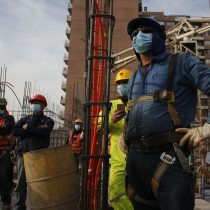
From this Monday, until November 27, Productivity Week is held, an activity carried out in a coordinated manner between the National Productivity Commission (CNP) and the Chilean Chamber of Construction (CCHC).
During this meeting, the CNP will be presenting the final findings and recommendations of the study sent to it by the Government in 2019, “Productivity in the construction sector”, to identify and analyze the main brakes on productivity in the sector, and propose a roadmap with measures aimed at overcoming the obstacles displayed.
According to the benchmark in building, national works have on average an indicator of 0.24 m2 per person-day, while the international sample is an average of 0.37 m2 per person-day, 53% higher. For example, if an average building in the 13-story national sample reached the productivity level of referring countries could mean adding 6 floors, using the same number of people. Similarly, local road infrastructure works, both public and private, are less productive. By measuring productivity as value added, they average US$ 99 per person-day, while in the international sample that average is US$ 317 per person-day, 220% higher.
Closing this productivity gap relative to the rest of the economy would add about $4.5 billion to the sector, more than 20% of the sector’s GDP today; and closing the productivity gap with those countries with average productivity would add about $13 billion more to the sector, i.e. increase current construction GDP by 65%.
With regard to the cost oversteer that the construction sector generates the problems arising from the lack of productivity, when comparing the execution of infrastructure in public works the national v/s international exhibition, in the first 50% of the projects has over costs, while in the second only 10%. At the same time, while 50% of works in Chile are delayed, in referring countries only 19% do so.
During his presentation, the executive secretary of the CNP, Rodrigo Krell, explained that the research analyzed the state and evolution of productivity in the construction sector, identifying the main barriers that inhibit greater efficiency in the development of public infrastructure works and private building, presenting a roadmap that prioritizes proposals that seek to solve these barriers, according to their impact and complexity of implementation.
The findings of the study and recommendations
Among the findings of the study, it is noted that the responsibility for solving the problems associated with lower productivity in the sector rests with both the State and the private ones.
With regard to the context in which the study was developed, he highlighted the low level of availability and systematization of information on public projects, so the lack of structured and readily available information is presented as a first relevant finding.
He explained that large public infrastructure works take, on average, more than 3 presidential terms to materialize. In part, this is because projects see their development fragmented, as explicit decision criteria are lacking in cases as relevant as the definition of the contract modality of a work.
“It places a strong emphasis on the benefits of early integration to improve productivity in the works. It notes that the relative importance attached to the pre-investment and design stages is much lower in Chile, as they represent between 2 and 3% of the total cost of the project, well below international international practices (up to 10%). And this is more relevant if we consider that the previous stage of execution has a significant interference in the works, since alterations in it account for up to 22% of the budget of a project, and 35% of the modifications of MOP in a year. These gaps result in gaps of up to 40pp in costs from referring countries, and delays resulting in up to 30pp of time limit extensions,” they say.
On the other hand, it noted that “the absence of a specialized dispute resolution mechanism in the development of public works by the traditional route leads to extensive and costly judicial proceedings in the face of problems between the parties. This discourages participation in such works (as 7 out of 10 cases are won by the state), and contracts are made more more.”
Improving the regulatory framework would allow for more efficient and more certain construction work development. There are significant problems in regulating the processing of authorizations and relevant procedures in construction.
The research presents a series of conclusions, a roadmap that considers the feasibility and priority of implementing the identified measures – critical actions in the short and medium term, and other strategic ones with greater horizon – and their expected impact. In total, the study includes 73 recommendations, which are classified with respect to the type of work it affects, the route of implementation and the institution in charge of implementing it.
In this way there are 5 recommendations to improve the construction of private building works, 25 works of public infrastructure and 43 that seek to address the obstacles identified in both subsectors of construction. As for the implementation path, 55 can be applied administratively and 18 require legal changes. The Ministry of Public Works is the great call to carry out the proposals, suggested by 21 other agencies to implement them.
Finally, the study warns that the complex scenario that arises from the emergence of COVID-19, creates the opportunity to analyze new and better ways of building where, for example, technological innovations, particular work schemes and sustainability measures stand out. Indeed, at the international level 2/3 of the construction sector’s business believes that the pandemic will catalyz changes towards new modes of construction.





